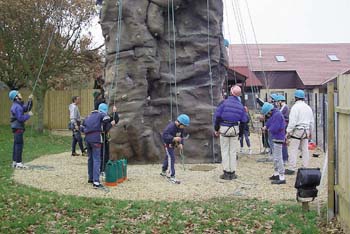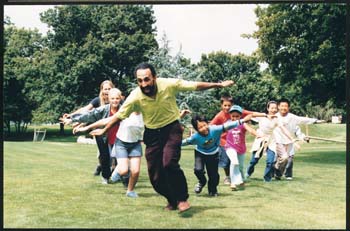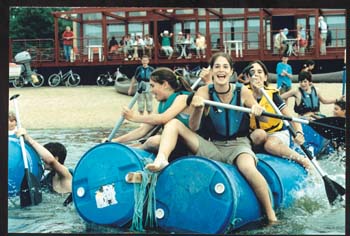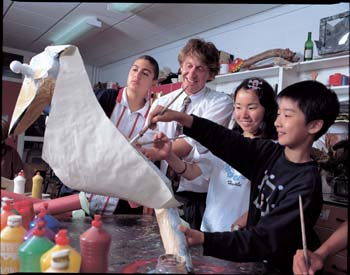

Would you like to receive publication updates from HLT? You can by joining the free mailing list today. |
Humanising Language Teaching
Year 5; Issue 2; March 03
Pilgrims Summer Courses for 8-17 Year Olds
Learning by Doing – Putting the fun back in to Learning
Mario Rinvolucri, Pilgrims, UK

Learning English needn't be boring – find out how Pilgrims makes learning fun for kids and see how you can earn yourself a free Teacher Training course by sendng them to Pilgrims this summer.
'OK class, please turn to page 75 in your Student's Book.' How often have we uttered these immortal words to our classes? As the vast majority of us have worked in syllabus bound environments it's hard to avoid them. Is there an alternative?

At Pilgrims, courses operate following an integrated syllabus that links every aspect of the course. From the moment a student wakes up till the time they go to bed, they are practising and recycling the input they have received. Constant contact with their fellow students and the staff, encourages them to use English constantly, builds their self-confidence, motivates them to learn and makes learning fun.

On a Pilgrims Action and Adventure Course at Uppingham School, on the morning that all the students are going climbing and abseiling, morning classes would include topic specific lexical and functional input. The use of realia to elicit and present the equipment needed for the activities would lead into use of the language in contextual situations culminating in a situational role-play at the end of the session.
For example, after being presented with the words like harness, carabiner, foothold, rope, fasten, clip on, the students would move on to controlled practice of these words in the context on giving and receiving instructions, and describing the process of getting ready to climb. The teacher would then give them a small situation in which they would have to use the target language in a freer context.

The consolidation of the language will then come during the activity itself. All the Action and Adventure activities at Uppingham are run by qualified trainers from Lakeside Leisure at Rutland Water. They will be using all the language associated with the activity and will expect the students to be familiar with it. Naturally, during the activity itself, the students will be obliged to interact with their peers and the instructors in English and will put into practice the language they have learnt. At the same time, they will be presented with new terms and expressions and these will be reviewed the following day in class.
What has happened then is that the students have become aware of the immediate need and use of the language, and it not being just another set of grammar rules and vocabulary that they may or may not use in the future. To them the association is that what they have learnt is linked to a fun outcome and they begin to change their attitudes to learning. They start looking forward to coming to class to learn new and exciting things which will permit them to derive the maximum benefit from the activities and experiences they will be presented with later that day or on the course.
“If you hear it, you remember it, if you read it you understand it, if you do it you never forget it”

Mornings on our courses are typically taken up by 3 hours of English lessons, in which students are presented with and practice the language they will be using later that day or on the course. This could be the language necessary for an afternoon of orienteering in the Kent countryside, the language for sailing or simply language useful for interacting and co-operating with their peers. As a teacher, you are aware of the course programme, what is in store for the afternoon and evening or the next day's excursion. You will then work with your students to build up their self-confidence and motivation so that they can determine for themselves that what they are doing in class will be of immediate practical use. Lessons provide the foundations for the students as they allow the teacher the flexibility to adapt and present the target language in the way best suited to the students' needs and personalities.
In the afternoon and evenings, staff provide and participate in a range of activities designed to further develop the students' fluency, independence and confidence, by using and recycling the English they have been learning. Activities include a variety of team sports, drama workshops, water sports, go-karting, talent shows, visits and excursions to name a few. Mother tongue quotas coupled with a very high (1:6) staff to student supervisory ratio make it easier for students to use English and for staff to encourage them to communicate in English.

'Teacher, how can I improve my listening?' 'And my speaking?' My advice now would include suggesting a Pilgrims course in the summer.
EARN YOURSELF A FREE 2 WEEK PILGRIMS TEACHER TRAINNG COURSE IN 2003!
Send 3 students on a Pilgrims 2003 8-17 year old's course and
Receive a Free 2 Week Pilgrims Teacher Training Course!
Contact: andrea@pilgrims.co.uk for more information!
|
For full information about Pilgrims courses :
Click Here |